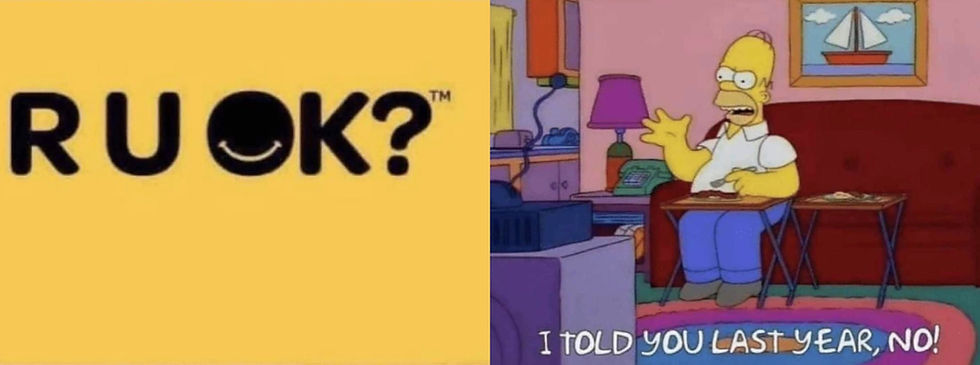So You're Not OK? What Now?
- Challenge Mag
- Sep 10, 2020
- 3 min read
Savannah Benson

Today is R U OK day.
It is also World Suicide Prevention day.
Both days have good intentions, aiming to start a necessary conversation about suicide and mental health, helping to reduce the stigma. But we need to ask ‘What do we do after someone says they’re not ok?’
This article is going to address two things:
1. The need to expand Medicare coverage of mental health services and ensure support is affordable and accessible; and
2. The stigma around mental illnesses and disorders.
Firstly, there needs to be far greater coverage of mental health services under Medicare as well as increased investment in bulk billed mental health services. There are limited numbers of psychologists who have bulk billing, for example, in Canberra, there are next to no bulk billed mental health services. Yes, there are some free services, such as Headspace or university psychologists for students such as myself. However, the lack of funding for such services, a lack of staff and sometimes over month long waiting lists can discourage people from continuing to see those services.
This leaves people with two options: seek out expensive mental health referrals or wait over a month for affordable services. Having searched for mental health services myself, it discouraged me from seeking the help I needed for over a year until I was pushed to go through the effort of getting help.
Once someone is able to access regular psychology appointments, Medicare rebates only cover 10 appointments each year. Anyone who has suffered from a mental illness knows that 10 appointments is not enough to provide the services necessary for proper treatment and recovery. Mental health must be treated like physical health and Medicare needs to cover more than just 10 appointments if effective treatment is to be provided.
If Governments are serious about mental health, more needs to be done to make mental health services more affordable and more accessible. Around 20% of the Australian Adult population will meet the criteria for anxiety, mood or substance use disorder in a given year. Underfunding of mental health services means that many people go without the care they desperately need. We need to go beyond just asking “R U OK?” and start asking what we can do and how we can better fund services.
Beyond funding services, we need to make sure people are not forced to choose between accessing mental health services and having paid work. There needs to be mechanisms in place to ensure no financial cost for those impacted by mental health issues seeking treatment and that workplaces accommodate those with mental health issues. When people’s productive or economic worth is prioritised over their well-being, this risks leaving people even further behind.
Secondly, more needs to be done to address the stigma surrounding mental illnesses outside the more well known illnesses of depression and anxiety. These are illnesses such as Borderline personality disorder, Bipolar Disorder and schizophrenia. These are mental disorders whose symptoms are not considered as treatable or socially acceptable, coming with a lot of stigma both among the general public and in the mental health profession itself. People with these disorders can be turned away by psychologists who refuse to deal with or treat their symptoms.
There needs to be far greater community awareness about such disorders and increased mental health support as well as a push for greater accommodation for people with mental health issues so they are not left behind. This also is an issue of affordability and accessibility as many of these illnesses require targeted treatment, treatment that goes beyond the 10 appointments covered by Medicare.
We need to ensure that when we ask people ‘R U OK?’ the support is there for people when they’re not ok. Governments need to stop asking if people are okay but instead ask what they can do to provide the mental health care that people so desperately need. When facing a global pandemic, increased unemployment and the prospect of climate disaster, the time for mental health reform has never been so important.
Savannah Benson is the ACT Young Left Co-Convenor and Young Fabians Secretary. Twitter





Comments